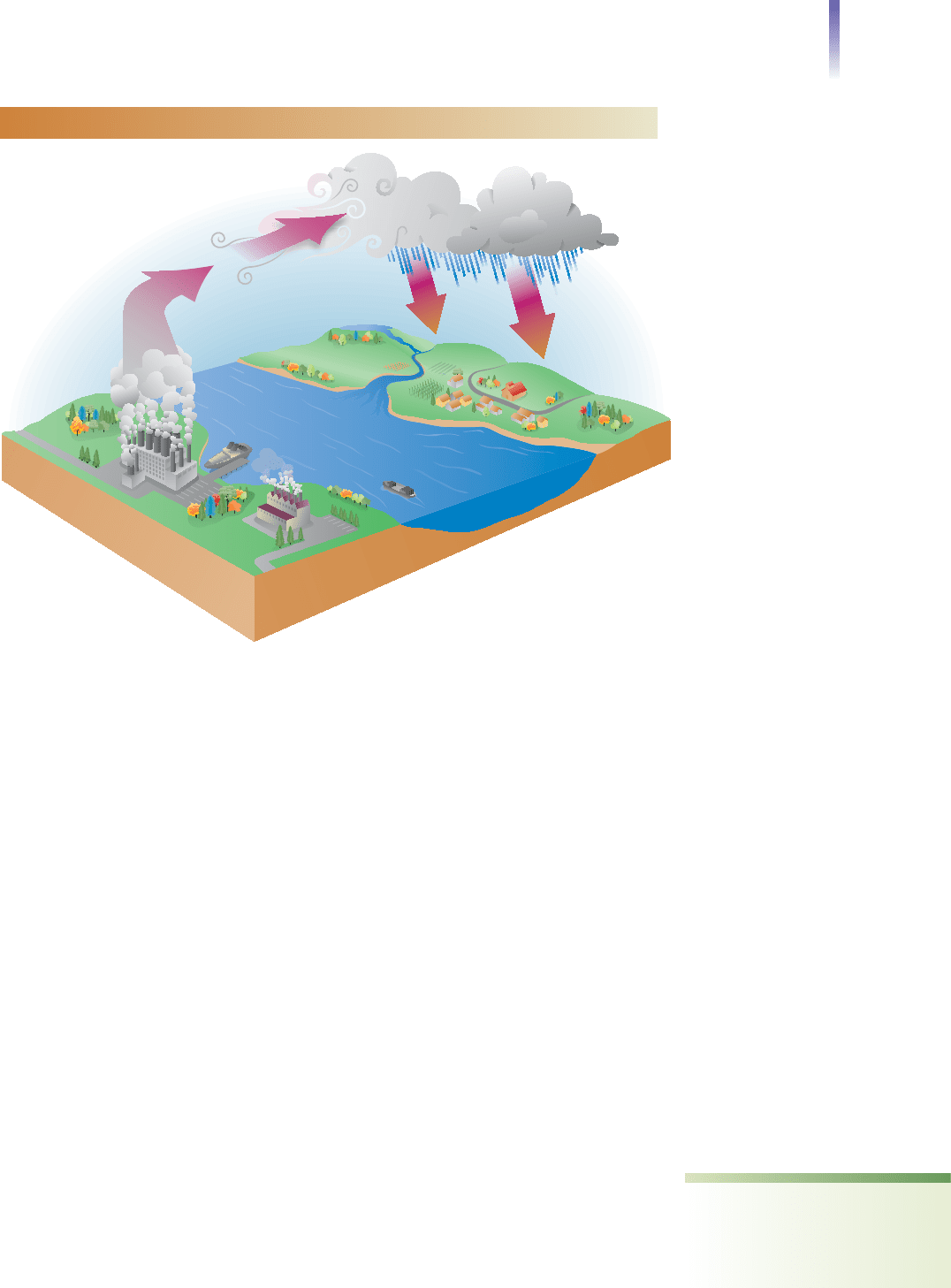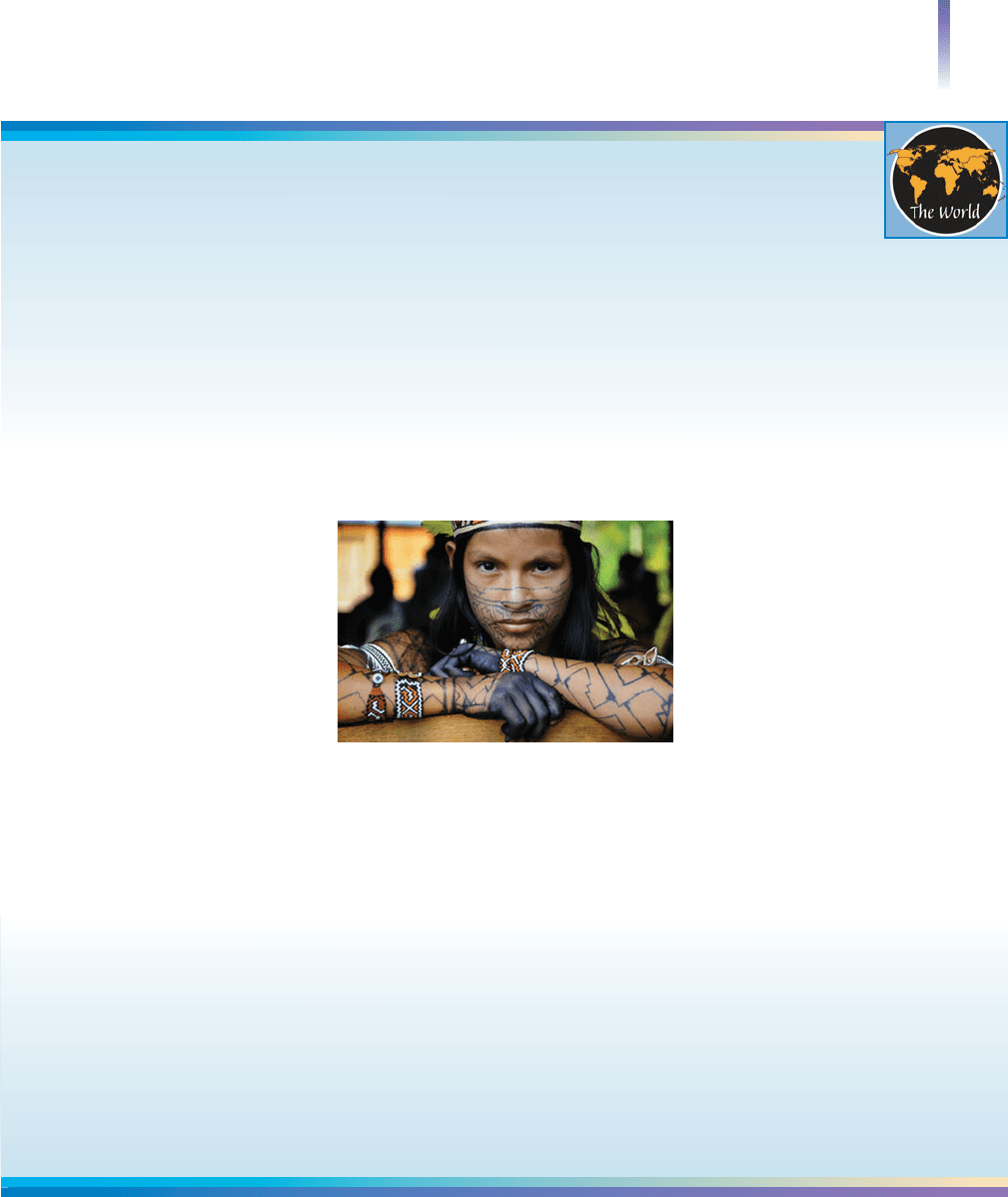Henslin James M. Sociology: A Down to Earth Approach
Подождите немного. Документ загружается.


Climate Change, have concluded that global warming is “unequivocal” and that human
activity is its main driver (Rosenthal and Revkin 2007). The Most Industrialized Nations
have agreed to cut in half the emissions that cause the greenhouse effect (Stolberg 2008).
If they don’t, the consequences are likely to be catastrophic.
The Energy Shortage and Multinational Corporations. If you ever read about an energy
shortage, you can be sure that what you read is false. There is no energy shortage, nor can
there ever be. We can produce unlimited low-cost power, which can help to raise the liv-
ing standards of humans across the globe. The sun, for example, produces more energy
than humanity could ever use. Boundless energy is also available from the tides and the
winds. In some cases, we need better technology to harness these sources of energy; in oth-
ers, we need only to apply the technology we already have.
Burning fossil fuels in internal combustion engines is the main source of pollution in
the Most Industrialized Nations. Of the technologies being developed to use alternative
sources of energy in vehicles, the most prominent is the gas-electric hybrid. Some of these
cars are expected to eventually get several hundred miles per gallon of gasoline. The
hybrid, however, is simply a bridge until vehicles powered by fuel cells become practical.
Fuel cells convert hydrogen into electricity; water, instead of carbon monoxide, will come
out of a car’s exhaust pipe.
Environmental Injustice. Unequal power has led to environmental injustice—mi-
norities and the poor being the ones who suffer the most from the effects of pollution
(Laszewski 2008). Industries locate where land is cheaper, which is not where the
wealthy live. Nor will the rich allow factories to spew pollution near their homes. As
a result, low-income communities, which are often inhabited by minorities, are more
likely to be exposed to pollution. Sociologists have studied, formed, and joined
environmental justice groups that fight to close polluting plants and block construction
of polluting industries.
The Growth Machine Versus the Earth 671
Acidic gases (sulfur
dioxide and
nitrogen oxide)
are released into
the atmosphere
Gases react with
moisture in the air
to form acid rain
(sulfuric and
nitric acids)
Acid rain kills plant
life and pollutes rivers
and streams
FIGURE 22.3 Acid Rain
environmental injustice
refers to how minorities and
the poor are harmed the most
by environmental pollution

Environmental Problems in the Industrializing
and Least Industrialized Nations
The Industrializing Nations are also major polluters. Of the world’s 40 most polluted
cities, 36 are in China (World Bank 2007:Figure 5). The nine thousand chemical plants along
its banks have turned China’s Yangtze River into an industrial sewer (Zakaria 2008). China’s
pollution is so great that it now emits more carbon dioxide than does the United States
(Rosenthal 2008). Like the Russians before them, Chinese who dare to speak out about pol-
lution are arrested and sent to prison (Feshbach 1992; J. Kahn 2007c). As China secures its
place in the industrialized world, its leaders will place more emphasis on controlling pollution.
Some of the Least Industrialized Nations lack environmental protection laws, which has
not gone unnoticed by opportunists in the Most Industrialized Nations. Some companies
produce chemicals in these nations that are outlawed in their own countries (Smith 1995;
Mol 2001). Others dump industrial wastes in these countries (Polgreen and Simons 2006).
Alarmed at the growing environmental destruction, the World Bank, the monetary arm of the
Most Industrialized Nations, has pressured the Least Industrialized Nations to reduce pollu-
tion. When New Delhi officials tried to comply, workers blocked traffic and set fires, closing
down the city for several days (Freund 2001). Understandably, the basic concern of workers
is to provide food for their families first, and to worry about the environment later. With this
in mind, the global financial crisis does not bode well for reducing our planet’s pollution.
A special concern is the rain forests. Although they cover just 6 percent of the earth’s land
area, the rain forests are home to one-half of all the earth’s plant and animal species (From-
mer 2007). Despite our knowledge that the rain forests are essential for humanity’s welfare,
we seem bent on destroying them for the sake of timber and farms. In the process, we ex-
tinguish plant and animal species, perhaps thousands a year. As biologists remind us, once
a species is lost, it is gone forever.
As the rain forests disappear, so do the Indian tribes who live in them. With their ex-
tinction goes their knowledge of the environment, the topic of the Cultural Diversity box
on the next page. Like Esau who traded his birthright for a bowl of porridge, we are ex-
changing our future for some lumber, farms, and pastures.
The Environmental Movement
Concern about environmental problems has produced a worldwide social movement.
One result is green parties, political parties whose central issue is the environment. In some
European countries, these parties have made a political impact. In Germany, for example,
672 Chapter 22 SOCIAL CHANGE AND THE ENVIRONMENT
Rising sea levels? No problem for
the Lilypad, floating self-
contained cities of 50,000
inhabitants envisioned for the
future.

the Green Party has won seats in the national legislature. Green parties have had little
success in the United States, but in the 2000 election, a green party headed by Ralph
Nader arguably tipped the balance and gave the presidential election to George W. Bush.
Activists in the environmental movement generally seek solutions in politics, education,
and legislation. Despairing that pollution continues, that the rain forests are still being
cleared, and that species are becoming extinct, some activists are convinced that the planet
is doomed unless urgent steps are taken. Choosing a more radical course, they use extreme
tactics to try to arouse indignation among the public and to force the government to act.
Convinced that they stand for true morality, many are willing to break the law and go to
jail for their actions. Such activists are featured in the following Thinking Critically section.
The Growth Machine Versus the Earth 673
Cultural Diversity around the World
The Rain Forests: Lost Tribes,
Lost Knowledge
I
n the past 100 years, 90 of Brazil’s 270 Indian tribes
have disappeared. Other tribes have moved to villages
as ranchers and gold miners have taken over their
lands. Tribal knowledge is lost as group members adapt
to village life.
Tribal groups are not ignorant people who barely
survive. On the contrary, these groups have developed
intricate forms of social organiza-
tion and possess knowledge that
has accumulated over thousands of
years. The Kayapo Indians, for ex-
ample, who belong to one of the
Amazon’s endangered tribes, use
250 types of wild fruit and hun-
dreds of nut and tuber species.
They cultivate thirteen types of ba-
nanas, eleven kinds of manioc (cas-
sava), sixteen strains of sweet
potato, and seventeen kinds of
yams. Many of these varieties are
unknown to non-Indians. The
Kayapo also use thousands of me-
dicinal plants, one of which contains a drug that is effec-
tive against intestinal parasites.
Until recently, Western scientists dismissed tribal
knowledge as superstitious and worthless. Now, how-
ever, some have come to realize that to lose tribes is to
lose valuable knowledge. In the Central African Repub-
lic, a man whose chest was being eaten away by an
amoeboid infection lay dying because the microbes did
not respond to drugs. Out of desperation, the Roman
Catholic nuns who were treating him sought the advice
of a native doctor. He applied crushed termites to the
open wounds. To the amazement of the nuns, the man
made a remarkable recovery.
With this example, I don’t mean to
imply that these tribes have medicine superior to ours,
just that we can learn from their experience with na-
ture. The disappearance of the rain forests means the
destruction of plant species that may have healing
properties. Some of the discoveries from the rain
forests have been astounding. The needles from a Hi-
malayan tree in India contain taxol, a drug that is effec-
tive against ovarian and breast cancer. A flower from
Madagascar is used in the treatment of leukemia; a frog
in Peru produces a painkiller that is more powerful,
but less addictive, than morphine
(Wolfensohn and Fuller 1998).
On average, one tribe of
Amazonian Indians has been lost
each year for the past century—
because of violence, greed for their
lands, and exposure to infectious
diseases against which these peo-
ple have little resistance. Ethnocen-
trism underlies much of this
assault. Perhaps the extreme is
represented by the cattle ranchers
in Colombia who killed eighteen
Cueva Indians. The cattle ranchers
were perplexed when they were
put on trial for murder. They asked why they should be
charged with a crime, since everyone knew that the
Cuevas were animals, not people. They pointed out that
there was even a verb in Colombian Spanish, cuevar,
which means “to hunt Cueva Indians.” So what was their
crime, they asked? The jury found them not guilty be-
cause of “cultural ignorance.”
For Your Consideration
What do you think we can do to stop the destruction
of the rain forests?
Sources: Durning 1990; Gorman 1991; Linden 1991; Stipp 1992; Nabhan
1998; Simons 2006.
A Pishta girl of the Yine tribe in the Peruvian
Amazon. The way of life of the world’s few
remaining rain forest tribes is threatened.

674 Chapter 22 SOCIAL CHANGE AND THE ENVIRONMENT
ThinkingCRITICALLY
Ecosabotage
C
haining oneself to a giant Douglas fir that is slated
for cutting, tearing down power lines and ripping up
survey stakes, driving spikes into redwood trees,
sinking whaling vessels, and torching SUVs and Hummers—
are these the acts of dangerous punks who have little un-
derstanding of the needs of modern society? Or are they
the acts of brave men and women who are willing to put
their freedom, and even their lives, on the line on behalf of
the earth itself?
To understand why ecosabotage—actions taken to
sabotage the efforts of people who are thought to be
legally harming the environment—is taking place, consider
the Medicine Tree, a 3,000-year-old redwood in the Sally
Bell Grove near the northern California coast. Georgia Pa-
cific, a lumber company, was determined to cut down the
Medicine Tree, the oldest and largest of the region’s red-
woods, which rests on a sacred site of the Sinkyone Indi-
ans. Members of Earth First! chained themselves to the
tree. After they were arrested, the sawing began. Other
protesters jumped over the police-lined barricade and
stood defiantly in the path of men wielding axes and chain
saws. A logger swung an axe and barely missed a demon-
strator. At that moment, the sheriff radioed a restraining
order, and the cutting stopped.
How many 3,000-year-old trees remain on our planet? Does our desire for fences and
picnic tables for backyard barbecues justify cutting them down? Issues like these—as well
as the slaughter of seals and whales, the destruction of the rain forests, and the drowning of
dolphins in mile-long drift nets—spawned Earth First! and other organizations devoted to
preserving the environment, such as Greenpeace, Rain Forest Action Network, the Ruckus
Society, and the Sea Shepherds.
“We feel like there are insane people who are consciously destroying our environment,
and we are compelled to fight back,” explains a member of one of the militant groups.“No
compromise in defense of Mother Earth!” says another.“With famine and death approaching,
we’re in the early stages of World War III,” adds another.
Radical environmentalists represent a broad range of activities and purposes. They are
united neither on tactics nor on goals. Most envision a simpler lifestyle that will consume
less energy and reduce pressure on the earth’s resources. Some want to stop a specific ac-
tion, such as the killing of whales. Others want to destroy all nuclear weapons and disman-
tle nuclear power plants. Some want everyone to become a vegetarian. Still others want the
earth’s population to drop to one billion, roughly what it was in 1800. Some even want hu-
mans to return to hunting and gathering societies. These groups are so splintered that Dave
Foreman—the founder of Earth First!—quit his own organization when it became too con-
frontational for his taste.
Radical groups have had some successes.They have brought a halt to the killing of dol-
phins off Japan’s Iki Island, achieved a ban on whaling, established trash recycling programs,
and saved hundreds of thousands of acres of trees, including, of course, the Medicine Tree.
For Your Consideration
Should we applaud ecosaboteurs or jail them? As symbolic interactionists stress, it all depends
on how you view their actions. And as conflict theorists emphasize, your view likely depends
on your social location. That is, if you own a lumber company, you will see ecosaboteurs
Julia “Butterfly” Hill lived for two
years in this 1,000-year-old
redwood tree, which she named
Luna. The Pacific Lumber
Company finally agreed to save the
tree and a 200-foot buffer zone.
ecosabotage actions taken to
sabotage the efforts of people
who are thought to be legally
harming the environment

The Growth Machine Versus the Earth 675
Environmental Sociology
A specialization within sociology is environmental sociology, whose focus is the relation-
ship between human societies and the environment (Dunlap and Catton 1979, 1983;
Bell 2009). Environmental sociology is built around these key ideas:
1. The physical environment should be a significant variable in sociological investigation.
2. Human beings are but one species among many that depend on the natural
environment.
3. Because of feedback to nature, human actions have many unintended consequences.
4. The world is finite, so there are physical limits to economic growth.
5. Economic expansion requires increased extraction of resources from the environment.
6. Increased extraction of resources leads to ecological problems.
7. These ecological problems place limits on economic expansion.
8. Governments create environmental problems by encouraging the accumulation
of capital.
9. For the welfare of humanity, environmental problems must be solved.
The goal of environmental sociology is not to stop pollution or nuclear power but, rather,
to study how humans (their cultures, values, and behavior) affect the physical environment
and how the physical environment affects human activities. Not surprisingly, environmen-
tal sociology attracts environmental activists, and the Section on Environment and Technol-
ogy of the American Sociological Association tries to influence governmental policies
(American Sociological Association n.d.).
Technology and the Environment: The Goal of Harmony. It is inevitable that humans
will continue to develop new technologies. But the abuse of our environment by those
Pollution in the Industrializing Nations has
become a major problem. Shown here is
a child swimming in the waters of
Cilincing Beach in Jakarta, Indonesia.
environmental sociology
a specialty within sociology
whose focus is how humans af-
fect the environment and how
the environment affects humans
differently than a camping enthusiast will. How does your own view of ecosaboteurs depend
on your life situation? What effective alternatives to ecosabotage are there for people who
are convinced that we are destroying the very life support system of our planet?
Sources: Carpenter 1990; Eder 1990; Foote 1990; Parfit 1990; Reed and Benet 1990; Knickerbocker
2003; Gunther 2004; Fattig 2007.

technologies is not inevitable. To understate
the matter, the destruction of our planet is
an unwise choice.
If we are to live in a world that is worth
passing on to coming generations, we
must seek harmony between technology
and the natural environment. This will
not be easy. At one extreme are people
who claim that to protect the environment
we must eliminate industrialization and
go back to a tribal way of life. At the other
extreme are people who are blind to the
harm being done to the natural environ-
ment, who want the entire world to indus-
trialize at full speed. Somewhere, there
must be a middle ground, one that recog-
nizes not only that industrialization is here
to stay but also that we can control it, for
it is our creation. Controlled, industrial-
ization can enhance our quality of life; un-
controlled, it will destroy us.
It is essential, then, that we develop
ways to reduce or eliminate the harm that
technology does to the environment. This
includes mechanisms to monitor the pro-
duction and use of technology and the disposal of its wastes. The question, of course,
is whether we have the resolve to take the steps necessary to preserve the environment
for future generations. What is at stake is nothing less than the welfare of planet Earth.
Surely that is enough to motivate us to make wise choices.
676 Chapter 22 SOCIAL CHANGE AND THE ENVIRONMENT
SUMMARY and REVIEW
How Social Change Transforms Social Life
What major trends have transformed the course
of human history?
The primary changes in human history are the four social
revolutions (domestication, agriculture, industrialization,
and information); the change from Gemeinschaft to
Gesellschaft societies; capitalism and industrialization; and
global stratification. Social movements indicate cutting
edges of social change. Ethnic conflicts and power rivalries
threaten the global divisions that the Most Industrialized
Nations have worked out. We may also be on the cutting
edge of a new biotech society. Pp. 652–656.
Theories and Processes of Social Change
What are the main theories of social change?
Evolutionary theories assume that societies move from the
same starting point to some similar ending point. Unilinear
theories assume the same evolutionary path for every society,
while multilinear theories assume that different paths lead
to the same stage of development. Cyclical theories view civ-
ilizations as going through a process of birth, youth, matu-
rity, decline, and death. Conflict theorists view social change
as inevitable, for each thesis (basically an arrangement of
power) contains antitheses (contradictions). A new synthesis
develops to resolve these contradictions, but it, too, contains
contradictions that must be resolved, and so on. This is
called a dialectical process. Pp. 656–658.
What is Ogburn’s theory of social change?
William Ogburn identified technology as the basic cause
of social change, which comes through three processes:
invention, discovery, and diffusion. The term cultural
lag refers to symbolic culture lagging behind changes in
technology. Pp. 658–660.
How Technology Changes Society
How does new technology affect society?
Because technology is an organizing force of social life,
changes in technology can have profound effects. The
automobile and the computer were used as extended ex-
amples. The computer is changing the way we learn,
The social movement that centers on the environment has become global. In all
nations, people are concerned about the destruction of the earth’s resources. This
photo is a sign of changing times. Instead of jumping on this beached whale and
carving it into pieces, these Brazilians are doing their best to save its life.

Summary and Review 677
THINKING CRITICALLY ABOUT Chapter 22
1. How has social change affected your life? Be specific—what
changes, how? Does Ogburn’s theory help to explain your
experiences? Why or why not?
2. In what ways does technology change society?
3. Do you think that a sustainable environment should be a
goal of the world’s societies? Why or why not? If so, what
practical steps do you think we can take to produce a sus-
tainable environment?
work, do business, and fight wars. We don’t yet know
whether information technologies will help to perpetuate
or to reduce social inequalities on both a national and a
global level. Pp. 660–668.
The Growth Machine Versus the Earth
What are the environmental problems of the Most
Industrialized Nations?
The environmental problems of the Most Industrialized
Nations range from smog and acid rain to the greenhouse
effect. Global warming is likely to have severe conse-
quences for the world. Burning fossil fuels in internal
combustion engines lies at the root of many environmen-
tal problems. The location of factories and hazardous
waste sites creates environmental injustice, environ-
mental problems having a greater impact on minorities
and the poor. Pp. 668–672.
Do the Industrializing and Least Industrialized Nations
have environmental problems?
The rush of the Least Industrialized Nations to industri-
alize is adding to the planet’s environmental decay. The
pollution in China is so severe that China now emits
more carbon dioxide than the United States does. Envi-
ronmental activists in China are arrested and impris-
oned. The world is facing a basic conflict between the
lust for profits through the exploitation of the earth’s re-
sources and the need to establish a sustainable
environment. P. 672.
What is the environmental movement?
The environmental movement is an attempt to restore a
healthy environment for the world’s people. This global
social movement takes many forms, from peaceful at-
tempts to influence the political process to ecosabotage.
Pp. 673–674.
What is environmental sociology?
Environmental sociology is not an attempt to change
the environment, but, rather, is a study of the relation-
ship between humans and the environment. Environ-
mental sociologists are generally also environmental
activists. Pp. 674–676.
ADDITIONAL RESOURCES
Where Can I Read More on This Topic?
Suggested readings for this chapter are listed at the back of this book.
What can you find in MySocLab? www.mysoclab.com
• Complete Ebook
• Practice Tests and Video and Audio activities
• Mapping and Data Analysis exercises
• Sociology in the News
• Classic Readings in Sociology
• Research and Writing advice

As you explored social life in this textbook, I hope that you
found yourself thinking along with me. If so, you should
have gained a greater understanding of why people think,
feel, and act as they do—as well as insights into why you
view life the way you do. Developing your sociological
imagination was my intention in writing this book. I have
sincerely wanted to make sociology come alive for you.
Majoring in Sociology
If you feel a passion for peering beneath the surface—for
seeking out the social influences in people’s lives, and for
seeing these influences in your own life—this is the best
reason to major in sociology. As you take more courses in
sociology, you will continue this enlightening process of
social discovery. Your sociological perspective will grow,
and you will become increasingly aware of how social fac-
tors underlie human behavior.
In addition to people who have a strong desire to con-
tinue this fascinating process of social discovery, there is a
second type of person whom I also urge to major in soci-
ology. Let’s suppose that you have a strong, almost unbri-
dled sense of wanting to explore many aspects of life. Let’s
also assume that because you have so many interests, you
can’t make up your mind about what you want to do with
your life. You can think of so many things you’d like to try,
but for each one there are other possibilities that you find
equally as compelling. Let me share what one student who
read this text wrote me:
I’d love to say what my current major is—if only I truly knew.
I know that the major you choose to study in college isn’t nec-
essarily the field of work you’ll be going into. I’ve heard
enough stories of grads who get jobs in fields that are not even
related to their majors to believe it to a certain extent. My only
problem is that I’m not even sure what it is I want to study, or
what I truly want to be in the future for that matter.
The variety of choices I have left open for myself are
very wide, which creates a big problem, because I know I
have to narrow it down to just one, which isn’t something
easy at all for me. It’s like I want to be the best and do the
best (medical doctor), yet I also wanna do other things
(such as being a paramedic, or a cop, or firefighter, or a
pilot), but I also realize I’ve only got one life to live. So the
big question is: What’s it gonna be?
This note reminded me of myself. In my reply, I said:
You sound so much like myself when I was in college. In
my senior year, I was plagued with uncertainty about what
would be the right course for my life. I went to a counselor
and took a vocational aptitude test. I still remember the
day when I went in for the test results. I expected my fu-
ture to be laid out for me, and I hung on every word. But
then I heard the counselor say, “Your tests show that mor-
tician should be one of your vocational choices.”
Mortician! I almost fell off my chair. That choice was so
far removed from anything that I wanted that I immedi-
ately gave up on such tests.
I like your list of possibilities: physician, cop, firefighter,
and paramedic. In addition to these, mine included cow-
boy, hobo, and beach bum. One day, I was at the dry clean-
ers (end of my sophomore year in college), and the guy
standing next to me was a cop. We talked about his job,
and when I left the dry cleaners, I immediately went to the
police station to get an application. I found out that I had
to be 21, and I was just 20. I went back to college.
I’m very happy with my choice. As a sociologist, I am
able to follow my interests. I was able to become a hobo (or
at least a traveler and able to experience different cultural
settings). As far as being a cop, I developed and taught a
course in the sociology of law.
One of the many things I always wanted to be was an
author. I almost skipped graduate school to move to Green-
wich Village and become a novelist. The problem was that
I was too timid, too scared of the unknown—and I had no
support at all—to give it a try. My ultimate choice of soci-
ologist has allowed me to fulfill this early dream.
It is sociology’s breadth that is so satisfying to those of us
who can’t seem to find the limit to our interests, who can’t
pin ourselves down to just one thing in life. Sociology cov-
ers all of social life. Anything and everything that people
do is part of sociology. For those of us who feel such broad,
and perhaps changing interests, sociology is a perfect major.
But what if you already have a major picked out, yet
you really like thinking sociologically? You can minor in
sociology. Take sociology courses that continue to pique
your sociological imagination. Then after college, con-
tinue to stimulate your sociological interests through your
reading, including novels. This ongoing development of
your sociological imagination will serve you well as you
go through life.
EPILOGUE: WHY MAJOR IN SOCIOLOGY?
678

But What Can You Do
With a Sociology Major?
I can just hear someone say: “That’s fine for you, since
you became a sociologist. I don’t want to go to graduate
school, though. I just want to get my bachelor’s degree
and get out of college and get on with life. So, how can a
bachelor’s in sociology help me?”
This is a fair question. Just what can you do with a
bachelor’s degree in sociology?
A few years ago, in my sociology department we began to
develop a concentration in applied sociology. At that time,
since this would be a bachelor’s degree, I explored this very
question. I was surprised at the answer: Almost anything!
It turns out that most employers don’t care what you
major in. (Exceptions are some highly specialized fields
such as nursing, computers, and engineering.) Most em-
ployers just want to make certain that you have completed
college, and for most of them one degree is the same as an-
other. College provides the base on which the employer builds.
Because you have your bachelor’s degree—no matter
what it is in—employers assume that you are a responsi-
ble person. This credential implies that you have proven
yourself: You were able to stick with a four-year course,
you showed up for classes, listened to lectures, took notes,
passed tests, and carried out whatever assignments you
were given. On top of this base of presumed responsibil-
ity, employers add the specifics necessary for you to per-
form their particular work, whether that be in sales or
service, in insurance, banking, retailing, marketing, prod-
uct development, or whatever.
If you major in sociology, you don’t have to look for a
job as a sociologist. If you ever decide to go on for an ad-
vanced degree, that’s fine. But such plans are not necessary.
The bachelor’s in sociology can be your passport to most
types of work in society.
Final Note
I want to conclude by stressing the reason to major in so-
ciology that goes far beyond how you are going to make
a living. It is the sociological perspective itself, the way of
thinking and understanding that sociology provides.
Wherever your path in life may lead, the sociological per-
spective will accompany you.
You are going to live in a fast-paced, rapidly changing
society that, with all its conflicting crosscurrents, is going
to be in turmoil. The sociological perspective will cast a
different light on life’s events, allowing you to perceive
them in more insightful ways. As you watch television,
attend a concert, converse with a friend, listen to a boss
or co-worker—you will be more aware of the social con-
texts that underlie such behavior. The sociological per-
spective that you develop as you major in sociology will
equip you to view what happens in life differently from
someone who does not have your sociological back-
ground. Even events in the news will look different to
you.
The final question that I want to leave you with, then,
is, “If you enjoy sociology, why not major in it?”
With my best wishes for your success in life,
Epilogue 679

GLOSSARY
G
bourgeoisie Marx’s term for capitalists, those
who own the means of production
bureaucracy a formal organization with a hi-
erarchy of authority and a clear division of
labor; emphasis on impersonality of positions
and written rules, communications, and
records
capital punishment the death penalty
capitalism an economic system characterized by
the private ownership of the means of production,
the pursuit of profit, and market competition
cargo cult a social movement in which South
Pacific islanders destroyed their possessions in
the anticipation that their ancestors would ship
them new goods
case study an intensive analysis of a single event,
situation, or individual
caste system a form of social stratification in
which people’s statuses are determined by birth
and are lifelong
category people, objects, and events that have
similar characteristics and are classified together
centrist party a political party that represents
the center of political opinion
charisma literally, an extraordinary gift from
God; more commonly, an outstanding, “mag-
netic” personality
charismatic authority authority based on an
individual’s outstanding traits, which attract fol-
lowers
charismatic leader literally, someone to whom
God has given a gift; in its extended sense, some-
one who exerts extraordinary appeal to a group
of followers
checks and balances the separation of powers
among the three branches of U.S. government—
legislative, executive, and judicial—so that each
is able to nullify the actions of the other two,
thus preventing any single branch from domi-
nating the government
church according to Durkheim, one of the
three essential elements of religion—a moral
community of believers; also refers to a large,
highly organized religious group that has formal,
sedate worship services with little emphasis on
evangelism, intense religious experience, or per-
sonal conversion
circular reaction Robert Park’s term for a back-
and-forth communication among the members
of a crowd whereby a “collective impulse” is
transmitted
citizenship the concept that birth (and resi-
dence or naturalization) in a country imparts
basic rights
city a place in which a large number of people
are permanently based and do not produce their
own food
anti-Semitism prejudice, discrimination, and
persecution directed against Jews
apartheid the separation of racial–ethnic
groups as was practiced in South Africa
applied sociology the use of sociology to solve
problems—from the micro level of classroom in-
teraction and family relationships to the macro
level of crime and pollution
ascribed status a position an individual either
inherits at birth or receives involuntarily later in
life
assimilation the process of being absorbed into
the mainstream culture
authoritarian leader an individual who leads
by giving orders
authoritarian personality Theodor Adorno’s
term for people who are prejudiced and rank
high on scales of conformity, intolerance, inse-
curity, respect for authority, and submissiveness
to superiors
authority power that people consider legiti-
mate, as rightly exercised over them; also called
legitimate power
back stage places where people rest from their
performances, discuss their presentations, and
plan future performances
background assumption a deeply embedded,
common understanding of how the world oper-
ates and of how people ought to act
barter the direct exchange of one item for another
basic demographic equation the growth rate
equals births minus deaths plus net migration
basic
or pure sociology sociological research
for the purpose of making discoveries about life
in human groups, not for making changes in
those groups
bilineal (system of descent) a system of reckon-
ing descent that counts both the mother’s and
the father’s side
biotech society a society whose economy in-
creasingly centers on the application of genet-
ics—human genetics for medicine, and plant
and animal genetics for the production of food
and materials
blended family a family whose members were
once part of other families
body language the ways in which people use
their bodies to give messages to others
bonded labor (indentured service) a contrac-
tual system in which someone sells his or her
body (services) for a specified period of time in
an arrangement very close to slavery, except that
it is entered into voluntarily
born again a term describing Christians who
have undergone a religious experience so life-
transforming that they feel they have become new
persons
achieved statuses positions that are earned, ac-
complished, or involve at least some effort or ac-
tivity on the individual’s part
acid rain rain containing sulfuric and nitric
acids (burning fossil fuels release sulfur dioxide
and nitrogen oxide that become sulfuric and ni-
tric acids when they react with moisture in the
air)
acting crowd an excited group of people who
move toward a goal
activity theory the view that satisfaction dur-
ing old age is related to a person’s amount and
quality of activity
age cohort people born at roughly the same
time who pass through the life course together
ageism prejudice, discrimination, and hostility
directed against people because of their age; can
be directed against any age group, including youth
agent provocateur someone who joins a group
in order to spy on it and to sabotage it by pro-
voking its members to commit extreme acts
agents of socialization people or groups that
affect our self-concept, attitudes, behaviors, or
other orientations toward life
aggregate individuals who temporarily share
the same physical space but who do not see
themselves as belonging together
agricultural revolution the second social rev-
olution, based on the invention of the plow,
which led to agricultural societies
agricultural society a society based on large-
scale agriculture
alienation Marx’s term for workers’ lack of con-
nection to the product of their labor; caused by
workers being assigned repetitive tasks on a small
part of a product—this leads to a sense of power-
lessness and normlessness; others use the term in
the general sense of not feeling a part of something
alterative social movement a social movement
that seeks to alter only some specific aspects of
people and institutions
alternative medicine medical treatment other
than that of standard Western medicine; often
refers to practices that originate in Asia, but may
also refer to taking vitamins not prescribed by a
doctor
anarchy a condition of lawlessness or political
disorder caused by the absence or collapse of gov-
ernmental authority
animism the belief that all objects in the world
have spirits, some of which are dangerous and
must be outwitted
anomie Durkheim’s term for a condition of so-
ciety in which people become detached from the
usual norms that guide their behavior
anticipatory socialization the process of learn-
ing in advance an anticipated future role or status
